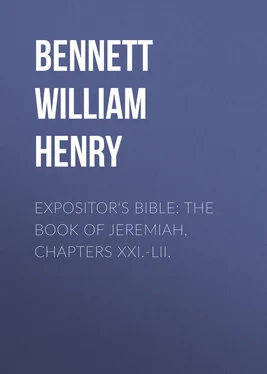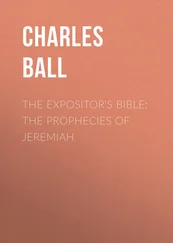William Bennett - Expositor's Bible - The Book of Jeremiah, Chapters XXI.-LII.
Здесь есть возможность читать онлайн «William Bennett - Expositor's Bible - The Book of Jeremiah, Chapters XXI.-LII.» — ознакомительный отрывок электронной книги совершенно бесплатно, а после прочтения отрывка купить полную версию. В некоторых случаях можно слушать аудио, скачать через торрент в формате fb2 и присутствует краткое содержание. Издательство: Иностранный паблик, Жанр: foreign_religion, foreign_antique, foreign_prose, на английском языке. Описание произведения, (предисловие) а так же отзывы посетителей доступны на портале библиотеки ЛибКат.
- Название:Expositor's Bible: The Book of Jeremiah, Chapters XXI.-LII.
- Автор:
- Издательство:Иностранный паблик
- Жанр:
- Год:неизвестен
- ISBN:нет данных
- Рейтинг книги:5 / 5. Голосов: 1
-
Избранное:Добавить в избранное
- Отзывы:
-
Ваша оценка:
- 100
- 1
- 2
- 3
- 4
- 5
Expositor's Bible: The Book of Jeremiah, Chapters XXI.-LII.: краткое содержание, описание и аннотация
Предлагаем к чтению аннотацию, описание, краткое содержание или предисловие (зависит от того, что написал сам автор книги «Expositor's Bible: The Book of Jeremiah, Chapters XXI.-LII.»). Если вы не нашли необходимую информацию о книге — напишите в комментариях, мы постараемся отыскать её.
Expositor's Bible: The Book of Jeremiah, Chapters XXI.-LII. — читать онлайн ознакомительный отрывок
Ниже представлен текст книги, разбитый по страницам. Система сохранения места последней прочитанной страницы, позволяет с удобством читать онлайн бесплатно книгу «Expositor's Bible: The Book of Jeremiah, Chapters XXI.-LII.», без необходимости каждый раз заново искать на чём Вы остановились. Поставьте закладку, и сможете в любой момент перейти на страницу, на которой закончили чтение.
Интервал:
Закладка:
CHAPTER III
THE ROLL
The incidents which form so large a proportion of the contents of our book do not make up a connected narrative; they are merely a series of detached pictures: we can only conjecture the doings and experiences of Jeremiah during the intervals. Chapter xxvi. leaves him still exposed to the persistent hostility of the priests and prophets, who had apparently succeeded in once more directing popular feeling against their antagonist. At the same time, though the princes were not ill-disposed towards him, they were not inclined to resist the strong pressure brought to bear upon them. Probably the attitude of the populace varied from time to time, according to the presence among them of the friends or enemies of the prophet; and, in the same way, we cannot think of "the princes" as a united body, governed by a single impulse. The action of this group of notables might be determined by the accidental preponderance of one or other of two opposing parties. Jeremiah's only real assurance of safety lay in the personal protection extended to him by Ahikam ben Shaphan. Doubtless other princes associated themselves with Ahikam in his friendly action on behalf of the prophet.
Under these circumstances, Jeremiah would find it necessary to restrict his activity. Utter indifference to danger was one of the most ordinary characteristics of Hebrew prophets, and Jeremiah was certainly not wanting in the desperate courage which may be found in any Mohammedan dervish. At the same time he was far too practical, too free from morbid self-consciousness, to court martyrdom for its own sake. If he had presented himself again in the Temple when it was crowded with worshippers, his life might have been taken in a popular tumult, while his mission was still only half accomplished. Possibly his priestly enemies had found means to exclude him from the sacred precincts.
Man's extremity was God's opportunity; this temporary and partial silencing of Jeremiah led to a new departure, which made the influence of his teaching more extensive and permanent. He was commanded to commit his prophecies to writing. The restriction of his active ministry was to bear rich fruit, like Paul's imprisonment, and Athanasius' exile, and Luther's sojourn in the Wartburg. A short time since there was great danger that Jeremiah and the Divine message entrusted to him would perish together. He did not know how soon he might become once more the mark of popular fury, nor whether Ahikam would still be able to protect him. The roll of the book could speak even if he were put to death.
But Jeremiah was not thinking chiefly about what would become of his teaching if he himself perished. He had an immediate and particular end in view. His tenacious persistence was not to be baffled by the prospect of mob violence, or by exclusion from the most favourable vantage-ground. Renan is fond of comparing the prophets to modern journalists; and this incident is an early and striking instance of the substitution of pen, ink, and paper for the orator's tribune. Perhaps the closest modern parallel is that of the speaker who is howled down at a public meeting and hands his manuscript to the reporters.
In the record of the Divine command to Jeremiah, there is no express statement as to what was to be done with the roll; but as the object of writing it was that "perchance the house of Judah might hear and repent," it is evident that from the first it was intended to be read to the people.
There is considerable difference of opinion 26 26 See Cheyne, Giesebrecht, Orelli, etc.
as to the contents of the roll. They are described as: "All that I have spoken unto thee concerning 27 27 R.V. "against." The Hebrew is ambiguous.
Jerusalem 28 28 So Septuagint. The Hebrew text has Israel, which is a less accurate description of the prophecies, and is less relevant to this particular occasion.
and Judah, and all the nations, since I (first) spake unto thee, from the time of Josiah until now." At first sight this would seem to include all previous utterances, and therefore all the extant prophecies of a date earlier than b. c. 605, i. e. those contained in chapters i. – xii. and some portions of xiv. – xx. (we cannot determine which with any exactness), and probably most of those dated in the fourth year of Jehoiakim, i. e. xxv. and parts of xlv. – xlix. Cheyne, 29 29 Jeremiah (Men of the Bible), p. 132.
however, holds that the roll simply contained the striking and comprehensive prophecy in chapter xxv. The whole series of chapters might very well be described as dealing with Jerusalem, Judah, and the nations; but at the same time xxv. might be considered equivalent, by way of summary, to all that had been spoken on these subjects. From various considerations which will appear as we proceed with the narrative, it seems probable that the larger estimate is the more correct, i. e. that the roll contained a large fraction of our Book of Jeremiah, and not merely one or two chapters. We need not, however, suppose that every previous utterance of the prophet, even though still extant, must have been included in the roll; the "all" would of course be understood to be conditioned by relevancy; and the narratives of various incidents are obviously not part of what Jehovah had spoken.
Jeremiah dictated his prophecies, as St. Paul did his epistles, to an amanuensis; he called his disciple Baruch 30 30 Cf. Chap. V. on "Baruch."
ben Neriah, and dictated to him "all that Jehovah had spoken, upon a book, in the form of a roll."
It seems clear that, as in xxvi., the narrative does not exactly follow the order of events, 31 31 Verses 5-8 seem to be a brief alternative account to 9-26.
and that verse 9, which records the proclamation of a fast in the ninth month of Jehoiakim's fifth year, should be read before verse 5, which begins the account of the circumstances leading up to the actual reading of the roll. We are not told in what month of Jehoiakim's fourth year Jeremiah received this command to write his prophecies in a roll, but as they were not read till the ninth month of the fifth year, there must have been an interval of at least ten months or a year between the Divine command and the reading by Baruch. We can scarcely suppose that all or nearly all this delay was caused by Jeremiah and Baruch's waiting for a suitable occasion. The long interval suggests that the dictation took some time, and that therefore the roll was somewhat voluminous in its contents, and that it was carefully compiled, not without a certain amount of revision.
When the manuscript was ready, its authors had to determine the right time at which to read it; they found their desired opportunity in the fast proclaimed in the ninth month. This was evidently an extraordinary fast, appointed in view of some pressing danger; and, in the year following the battle of Carchemish, this would naturally be the advance of Nebuchadnezzar. As our incident took place in the depth of winter, the months must be reckoned according to the Babylonian year, which began in April; and the ninth month, Kisleu, would roughly correspond to our December. The dreaded invasion would be looked for early in the following spring, "at the time when kings go out to battle." 32 32 1 Chron. xx. i.
Jeremiah does not seem to have absolutely determined from the first that the reading of the roll by Baruch was to be a substitute for his own presence. He had probably hoped that some change for the better in the situation might justify his appearance before a great gathering in the Temple. But when the time came he was "hindered" 33 33 'ĀCÛR : A.V., R.V., "shut up"; R.V. margin, "restrained." The term is used in xxxiii. 1, xxxix. 15, in the sense of "imprisoned," but here Jeremiah appears to be at liberty. The phrase 'ĀC̦ÛR W ĀZÛBH , A.V. "shut up or left" (Deut. xxxii. 36, etc.), has been understood, those under the restraints imposed upon ceremonial uncleanness and those free from these restraints, i. e. everybody; the same meaning has been given to 'ĀC̦ÛR here.
– we are not told how – and could not go into the Temple. He may have been restrained by his own prudence, or dissuaded by his friends, like Paul when he would have faced the mob in the theatre at Ephesus; the hindrance may have been some ban under which he had been placed by the priesthood, or it may have been some unexpected illness, or legal uncleanness, or some other passing accident, such as Providence often uses to protect its soldiers till their warfare is accomplished.
Интервал:
Закладка:
Похожие книги на «Expositor's Bible: The Book of Jeremiah, Chapters XXI.-LII.»
Представляем Вашему вниманию похожие книги на «Expositor's Bible: The Book of Jeremiah, Chapters XXI.-LII.» списком для выбора. Мы отобрали схожую по названию и смыслу литературу в надежде предоставить читателям больше вариантов отыскать новые, интересные, ещё непрочитанные произведения.
Обсуждение, отзывы о книге «Expositor's Bible: The Book of Jeremiah, Chapters XXI.-LII.» и просто собственные мнения читателей. Оставьте ваши комментарии, напишите, что Вы думаете о произведении, его смысле или главных героях. Укажите что конкретно понравилось, а что нет, и почему Вы так считаете.












